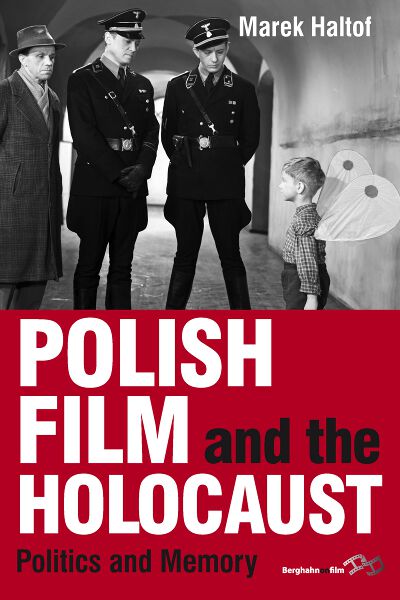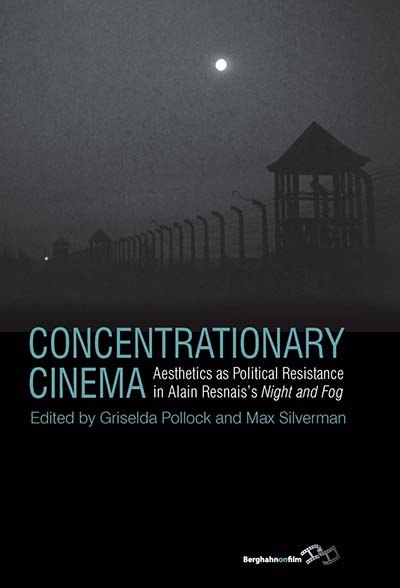
Email Newsletters
Sign up for our email newsletters to get customized updates on new Berghahn publications.
Polish Film and the Holocaust
Politics and Memory
Marek Haltof
288 pages, 87 illus., bibliog., index
ISBN 978-0-85745-356-3 $135.00/£104.00 / Hb / Published (January 2012)
ISBN 978-1-78238-496-0 $34.95/£27.95 / Pb / Published (March 2014)
eISBN 978-0-85745-357-0 eBook
Reviews
Choice Outstanding Academic Title 2012
“In this excellently researched, highly informative survey of Polish films about the Holocaust, Haltof… expands on a chapter in his valuable Polish National Cinema… His measured assessments, conveyed in clear, accessible prose, are rooted in an enviable command of both the relevant production documents and important secondary literature. The select list of relevant films and television programs is very useful. The ample notes and fine bibliography incorporate many Polish sources as well as all the available literature in English.” · Choice
“Marek Haltof’s monograph is the most comprehensive, scholarly contribution to have emerged in a long neglected field of study: the Holocaust in Polish film. His ‘survey’ is insightful and substantial, and sheds new light on films little known even to a connoisseur… [He] has intertwined the difficult theme of the complex and varying Communist policy (and politics) with the development of postwar cinema, while the linear narrative constitutes a sophisticated meditation on the difficulties faced by Polish and Polish-Jewish filmmakers in the decades since 1945. This is a significant study that will prove indispensable to historians of post-war Polish film and the Holocaust, separately and together, along with all those concerned with Polish-Jewish relations after 1945.” · Patterns of Prejudice
“By discussing many works that have fallen below Western critical radar, Haltof’s analyses offer a very useful mapping of the filmmakers and films that address these topics. He does not shy away from the sometimes difficult historical controversies the films elicit or from offering sensible criticisms of the artistic failings of certain works he discusses. With this volume, our understanding of Poland’s cinematic engagement with the Holocaust has been elevated to a new, higher level, even as certain omissions and blind spots in Haltof’s study shows how much more essential work still needs to be done.” · Cineaste Magazine
“Marek Haltof’s study is impressive in its breadth and depth. Polish Film and the Holocaust encompasses a variety of motion pictures — many of which were never released outside Poland — while illuminating individual titles with an informed, nuanced perspective… In the continually charged context of Polish-Jewish relations, Haltof’s book provides an elegant bridge between what he terms competing versions of victimization by history.” · Slavic Review
“…displays the same virtues as Marek Haltof’s Polish National Cinema, from the same publisher, to which the new book forms in a sense a companion piece. Here too one has a judicious and well-organized chronological survey… the result of a good deal of compilation, research and effective synthesis. The work is highly economical, packing discussion of a large number of films… into 229 pages of discursive text… Haltof’s book not only informs non-Poles about Poles’ attempts adequately to conceptualize events often considered beyond representation; his practice offers an examples and encouragement to further archival work.” · Studies in Eastern European Cinema
“Representations of the Holocaust are among the most well researched topics in contemporary film studies, but Polish cinema still remains of marginal interest to the international academic world… Therefore, Marek Haltof’s achievement is especially appreciated as he highlights different motives of the Holocaust in the works of Polish filmmakers in his complex and important study.” · Pol.Int.Org
“Marek Haltof’s monograph is the most comprehensive scholarly contribution to have emerged with respect to a long neglected field of study: the Holocaust in Polish film. Haltof’s ‘survey’ is insightful, substantial, and sheds new light on films little known even to a connoisseur. Most importantly his evocation of films made during the years of ‘official silence’… demands a re-evaluation from all scholars of post-war Jewish life in Poland… This is a significant study that will prove indispensable to historians of post-war Polish film, and the Holocaust, separately and together, along with all those concerned with Polish-Jewish relations after 1945.” · Polin
“…the author has identified a significant and little examined subject for study, and displays a deep knowledge of it… Where previously the issue of Polish film and the Holocaust had been addressed in single articles or chapters on the depiction of the Holocaust in particular films, here, for the first time we have a history.” · Jeremy Hicks, University of London
Description
During World War II Poland lost more than six million people, including about three million Polish Jews who perished in the ghettos and extermination camps built by Nazi Germany in occupied Polish territories. This book is the first to address the representation of the Holocaust in Polish film and does so through a detailed treatment of several films, which the author frames in relation to the political, ideological, and cultural contexts of the times in which they were created. Following the chronological development of Polish Holocaust films, the book begins with two early classics: Wanda Jakubowska’s The Last Stage (1948) and Aleksander Ford’s Border Street (1949), and next explores the Polish School period, represented by Andrzej Wajda’s A Generation (1955) and Andrzej Munk’s The Passenger (1963). Between 1965 and 1980 there was an “organized silence” regarding sensitive Polish-Jewish relations resulting in only a few relevant films until the return of democracy in 1989 when an increasing number were made, among them Krzysztof Kieślowski’s Decalogue 8 (1988), Andrzej Wajda’s Korczak (1990), Jan Jakub Kolski’s Keep Away from the Window (2000), and Roman Polański’s The Pianist (2002). An important contribution to film studies, this book has wider relevance in addressing the issue of Poland’s national memory.
Marek Haltof is Professor at Northern Michigan University in Marquette. His recent books include the Historical Dictionary of Polish Cinema (2007), Australian Cinema: The Screen Construction of Australia (in Polish, 2005), The Cinema of Krzysztof Kieślowski: Variations on Destiny and Chance (2004), and Polish National Cinema (2002).

